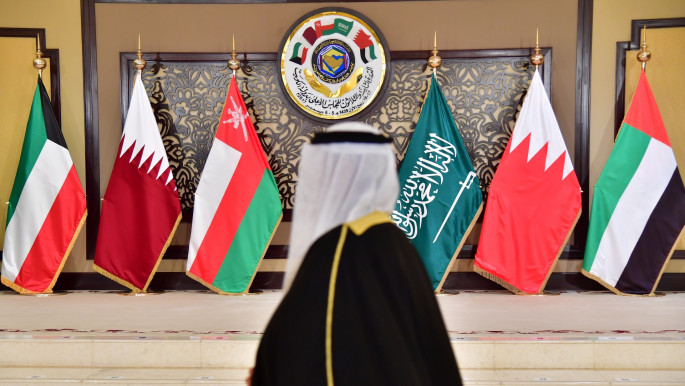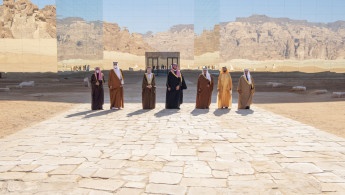How the GCC reconciliation deal could reshape the region's power balance
At the conclusion of the summit, the GCC countries and Egypt signed the 'Al-Ula declaration' which brought the blockade of Qatar to a formal end, and Riyadh announced the restoration of full ties between Qatar and the embargo nations.
Saudi Arabia and Qatar hailed Kuwaiti efforts to resolve the Gulf crisis, however, the diplomatic breakthrough came after a final push by the outgoing Trump administration. When the crisis erupted in June 2017 experts tried to make sense of it, but no one really understood the real reasons as there were no sensible ones.
Yet, there is a general consensus that the rise of Donald Trump to the White House tempted some GCC countries and encouraged them to provoke the crisis.
Ironically, the recent diplomatic breakthrough between the Gulf nations came after a final push by the outgoing Trump administration. The logic behind this push is not clear but one thing is sure in this riddle, the victory of Biden in US Presidential elections is a main driver of the reconciliation process. Indeed, the Trump administration might have wanted to deprive him of the credit for resolving the crisis.
 |
The reconciliation process will have geopolitical implications, with many countries breathing a sigh of relief |  |
Regardless, Doha emerged victorious out of this long, deep, and unprecedented feud in the GCC. While Qatar and Saudi Arabia had genuine motives and reasons to reconcile, some GCC countries appeared to have been dragged unwillingly to a resolution. One can clearly notice that the UAE's media outlets and officials didn't express enthusiasm towards the reconciliation, despite the sharp U-turn of some Emirati officials like Anwar Gargash.
This means that although the concerned countries might have put their sword in their sheath, there are no guarantees that we will not witness the same farce in the future. The normalisation process will take some time and a cold peace might arise. The crisis might have formally ended for now, but those responsible for it are still there - and so are the ideological differences.
 |
|
| Read more: Qatar crisis explained: As Gulf states end rift, how did we get here? |
Nevertheless, the Saudi-Qatari reconciliation is a positive and much needed step in the right direction. As the Saudi foreign minister put it, ending the blockade of Qatar is "a win for the region". The reconciliation process will have geopolitical implications on many levels. Countries such as Kuwait and Oman will breathe a sigh of relief.
These Gulf countries were under immense political, economic, and security pressure over the past few years. Although the new dynamics in the region will create a new set of challenges, especially when it comes to the position of Iran, these countries will be much more relaxed concerning the threat coming from within the GCC. The new leaders in both states can now focus more on the internal front and fortify their positions internally and regionally.
When it comes to other Arab monarchies such as Jordan and Morocco, these countries typically enjoy a good relationship with the GCC countries. They have strong bonds with Saudi Arabia, Qatar, and the UAE. During the first chapter of the 2017 Gulf crisis, they were pressured to choose sides, but not anymore.
The latest reconciliation will spare them from being in such a difficult position. And despite the UAE still exerting a considerable influence over Amman and Rabat, the reconciliation process will provide them with enough space to manoeuvre politically in case any disagreements emerge in the future between them and Abu Dhabi over regional issues.
 |
The crisis might have formally ended for now, but those responsible for it are still there - and so are the ideological differences |  |
Egypt, however, seems to be in a very awkward position. In the last six years or so, Cairo has been greatly influenced by the UAE. Recently, there have been signs that Egypt is seeking to gain some manoeuvring space to pursue interests that are not necessarily in line with Abu Dhabi. Yet, acknowledging the importance of Emirati influence, Egypt didn't seem to want to break with Abu Dhabi on key matters.
This might be one reason why Egypt's President Abdel-Fattah el-Sisi didn't personally attend the GCC summit and sent his foreign minister instead. From now on, Cairo will try to maximise its gains by benefiting from both sides. Just hours after the signing of the Al-Ula declaration in Saudi Arabia, Qatar's finance minister attended the opening ceremony of his country's one-billion-dollar luxury hotel in Cairo.
In the wider regional sphere, two powerful countries, Turkey and Pakistan, will benefit greatly from the reconciliation process. The Gulf crisis hurt Ankara and Islamabad both politically and economically. Both refused to bow to pressure and did not agree on the blockading countries' terms against Qatar.
They tried to mediate using a different set of tools, but to no avail. While Pakistan had to take its weak economic situation vis-à-vis Saudi Arabia and the UAE into consideration, Turkey decided to take Qatar's side and played a crucial role in helping Doha emerge as a victor.
 |
|
| Read more: Biden as president: Winners and losers in the Gulf |
The reconciliation process will bridge the gap created by the crisis between Saudi Arabia on the one hand, and both Turkey and Pakistan on the other. The fact that Saudi Arabia views Iran under Biden's incoming administration as the biggest threat to the region means that Riyadh would need Ankara and Islamabad on its side more than ever.
King Salman has already taken the first steps to mend relations with Turkey, but it remains to be seen whether Qatar will play a role in reintroducing the Crown Prince to Turkish officials or facilitate a route to the Turkish president if Qatar-Saudi relations significantly improve in the coming months.
Taking these new regional configurations into account, it is safe to assume that both Iran and the UAE will be the biggest losers from this development in the Gulf. The crisis forced Qatar and Turkey to mend their relations with Tehran, which benefited politically, economically, and security-wise from the crisis. Opening airspace for Qatari airplanes means that Iran will lose a vital source of hard currency at a critical time for Tehran.
 |
The normalisation process will take some time and a cold peace might arise, but reconciliation is a positive and much needed step in the right direction |  |
In his statement at the GCC summit, the Saudi Crown Prince Mohammed bin Salman (MBS) highlighted the rising threat of Iran. This is a clear indication that Riyadh expects GCC members to be united against the Iranian nuclear program, missile program, and Tehran's regional role. Tehran has always sought to create a rift between the GCC states and to negotiate bilaterally with each of them. A united GCC on these issues plays against the Iranian strategy.
Just like Iran, the UAE would have preferred to prolong the crisis. While participating in an event for 'The Economic Club of Washington D.C.' in November, Abu Dhabi's ambassador to Washington Yousef Al Otaiba said: "I don't think the Qatari rift will get any results soon. It is a small problem, not really being addressed, not on any one's priority list right now. I think we have a very philosophical disagreement over what we want our region to look like and we hadn't really sat down to figure out what the solution is. They want to go their way, we want to go ours, and I don't think anyone cares too much."
 |
|
| Read more: Don't look to Washington for peace in Israel-Palestine |
The fact that the UAE had to then sit and sign the 'Al-Ula declaration' shows Abu Dhabi's limits vis-à-vis Saudi Arabia, but this doesn't mean that things are really over.
Despite how it seemed, Saudi Arabia and the UAE had contrasting interests on several regional issues. The reconciliation might deepen this gap. While such rifts have always been bridged by the special bond between MBS and Abu Dhabi's Crown Prince Mohammed bin Zayed (MBZ), this relationship will be put to the test in the coming period.
The UAE is afraid that genuine reconciliation might drag Saudi Arabia away from the Emirati chartered path for the region. Better Saudi-Qatari relations will attract many regional countries to their side, including powerful ones such as Turkey and Pakistan, and to some extent Egypt. Out of fear that such a scenario would isolate Abu Dhabi and minimise its regional influence, the UAE will deepen its relations with Israel to compensate.
Ali Bakeer is an Ankara-based political analyst and researcher. He holds a PhD in political science and international relations. His interests include Middle East politics with a particular focus on Iran, GCC countries and Turkey.
Follow him on Twitter: @alibakeer



